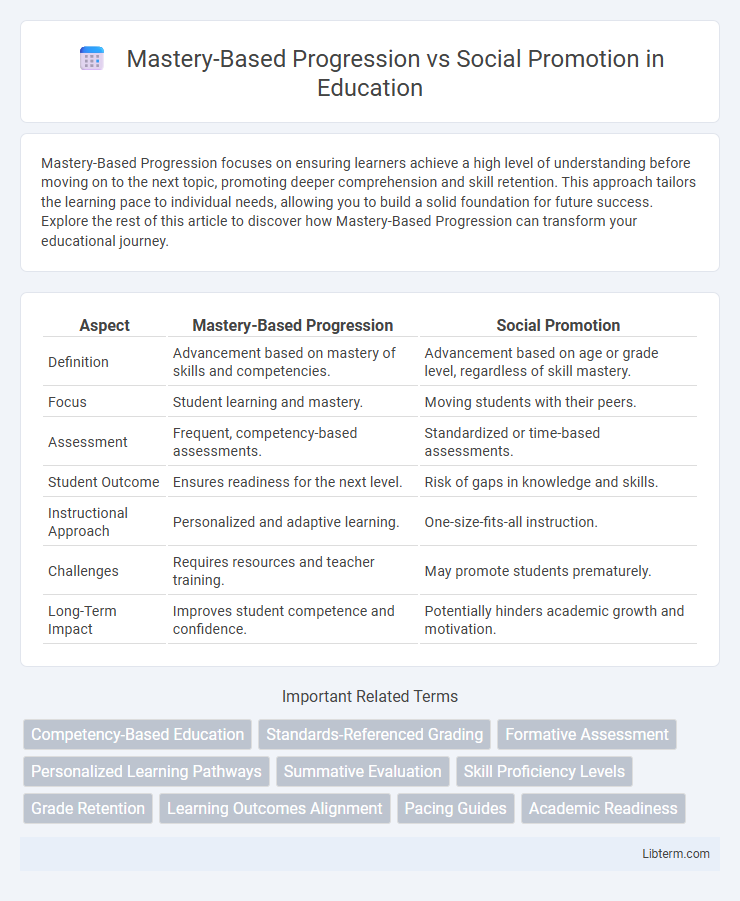Mastery-Based Progression focuses on ensuring learners achieve a high level of understanding before moving on to the next topic, promoting deeper comprehension and skill retention. This approach tailors the learning pace to individual needs, allowing you to build a solid foundation for future success. Explore the rest of this article to discover how Mastery-Based Progression can transform your educational journey.
Table of Comparison
| Aspect | Mastery-Based Progression | Social Promotion |
|---|---|---|
| Definition | Advancement based on mastery of skills and competencies. | Advancement based on age or grade level, regardless of skill mastery. |
| Focus | Student learning and mastery. | Moving students with their peers. |
| Assessment | Frequent, competency-based assessments. | Standardized or time-based assessments. |
| Student Outcome | Ensures readiness for the next level. | Risk of gaps in knowledge and skills. |
| Instructional Approach | Personalized and adaptive learning. | One-size-fits-all instruction. |
| Challenges | Requires resources and teacher training. | May promote students prematurely. |
| Long-Term Impact | Improves student competence and confidence. | Potentially hinders academic growth and motivation. |
Understanding Mastery-Based Progression
Mastery-Based Progression ensures students advance only after demonstrating thorough understanding of key concepts, promoting deeper learning and skill retention. This approach contrasts with Social Promotion, where students move to the next grade regardless of mastery, potentially leading to knowledge gaps. Emphasizing mastery results in personalized pacing, allowing educators to tailor instruction and intervention based on individual student performance.
Defining Social Promotion in Education
Social promotion in education refers to the practice of advancing students to the next grade level regardless of their academic performance or mastery of current grade standards. This approach prioritizes social and emotional factors over demonstrated competencies, often leading to students progressing without essential foundational skills. Critics argue that social promotion may contribute to gaps in knowledge, whereas mastery-based progression emphasizes competency before advancement.
Key Differences Between Mastery and Social Promotion
Mastery-based progression requires students to demonstrate a thorough understanding of specific skills or concepts before advancing, ensuring personalized learning and competency. Social promotion advances students based primarily on age or grade level, often disregarding individual academic readiness or mastery. The key difference lies in mastery-based progression prioritizing skill acquisition and comprehension, whereas social promotion emphasizes chronological advancement without guaranteed proficiency.
Academic Outcomes: Mastery vs Social Promotion
Mastery-Based Progression emphasizes academic outcomes by ensuring students achieve a comprehensive understanding of core concepts before advancing, leading to higher retention and deeper knowledge. Social Promotion allows progression based on age or grade level rather than mastery, often resulting in gaps in learning and lower academic performance. Research shows students in mastery-based systems demonstrate improved test scores and long-term academic success compared to those promoted socially without sufficient mastery.
Impact on Student Motivation
Mastery-based progression enhances student motivation by emphasizing skill mastery and personalized learning pace, fostering intrinsic motivation and self-efficacy. Social promotion often undermines motivation by advancing students without ensuring competency, leading to frustration and disengagement. Research indicates students in mastery-based systems demonstrate higher persistence and confidence compared to those subjected to social promotion.
Addressing Learning Gaps
Mastery-Based Progression targets addressing learning gaps by allowing students to advance only after demonstrating full understanding of the material, ensuring solid comprehension before moving forward. Social Promotion advances students based on age or grade level regardless of mastery, often leading to persistent learning gaps and academic struggles in subsequent grades. Implementing mastery-based approaches reduces knowledge deficiencies and better supports individualized student growth compared to traditional social promotion models.
Equity and Inclusivity Considerations
Mastery-based progression ensures students advance upon demonstrating understanding, promoting equity by addressing diverse learning paces and reducing the risk of leaving behind struggling learners. Social promotion passes students to the next grade regardless of mastery, risking gaps in foundational skills that can exacerbate educational inequities. Emphasizing mastery supports inclusivity by tailoring instruction to individual needs, fostering a more equitable learning environment for all students.
Teacher Roles in Both Systems
In mastery-based progression systems, teachers act as facilitators who provide personalized guidance, continuous assessment, and targeted interventions to ensure each student achieves competency before advancing. In contrast, social promotion relies on teachers to support students through grade levels without guaranteeing mastery, emphasizing social and emotional growth over academic readiness. Mastery-based models demand a more adaptive, data-driven role from educators, whereas social promotion places teachers in a role focused on maintaining class cohesion and managing diverse skill levels.
Real-World Case Studies and Results
Real-world case studies reveal that mastery-based progression significantly improves student achievement by allowing learners to advance upon demonstrating proficiency, reducing knowledge gaps prevalent in traditional social promotion systems. For example, research from the CompetencyWorks initiative shows schools implementing mastery-based models report higher graduation rates and better college readiness compared to districts relying on social promotion. In contrast, extensive data from urban districts practicing social promotion highlight increased dropout rates and lower standardized test scores, underscoring the efficacy of proficiency-focused progression in fostering long-term academic success.
Future Trends in Educational Progression
Mastery-Based Progression emphasizes personalized learning pathways where students advance upon demonstrating competency, aligning with growing trends in adaptive education technologies and data-driven assessment tools. Future educational progression increasingly integrates AI-powered platforms to monitor mastery levels, enabling tailored instruction that addresses individual learning gaps more effectively than traditional social promotion models. As schools adopt competency-based frameworks, social promotion is expected to decline, making way for progression systems that prioritize skill acquisition and readiness over age or grade level.
Mastery-Based Progression Infographic

 libterm.com
libterm.com